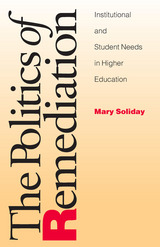
While some students need more writing instruction than others, The Politics of Remediation reveals how that need also pertains to the institutions themselves. Mary Soliday argues that universities may need remedial English to alleviate their own crises in admissions standards, enrollment, mission, and curriculum, and English departments may use remedial programs to mediate their crises in enrollment, electives, and relationships to the liberal arts and professional schools.
Following a brief history of remedial English and the political uses of remediation at CCNY before, during, and after the open admissions policy, Soliday questions the ways in which students’ need for remedial writing instruction has become widely associated with the need to acculturate minorities to the university. In disentangling identity politics from remediation, she challenges a powerful assumption of post-structuralist work: that a politics of language use is equivalent to the politics of access to institutions.
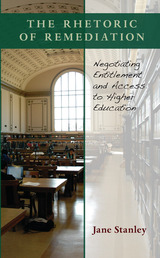
In The Rhetoric of Remediation, Jane Stanley examines the statements and actions made regarding remediation at the University of California, Berkeley (Cal). Since its inception in 1868, university rhetoric has served to negotiate the tensions between an ethic of access and the assertion of elite status. Great care has been taken to promote the politics of public accessibility, yet in its competition for standing among other institutions, Cal has been publicly critical of the “underpreparedness” of many entrants. Early on, Cal developed programs to teach “Subject A” (Composition) to the vast number of students who lacked basic writing skills.
Stanley documents the evolution of the university's “rhetoric of remediation” at key moments in its history, such as: the early years of “open gate” admissions; the economic panic of the late 1800s and its effect on enrollment; Depression-era battles over funding and the creation of a rival system of regional state colleges; the GI Bill and ensuing post-WWII glut in enrollments; the “Red Scare” and its attacks on faculty, administrators, and students; the Civil Rights Movement and the resultant changes to campus politics; sexist admission policies and a de facto male-quota system; accusations of racism in the instruction of Asian Americans during the 1970s; the effects of an increasing number of students, beginning in the 1980s, for whom English was a second language; and the recent development of the College Writing Program which combined freshmen composition with Subject A instruction, in an effort to remove the concept of remediation altogether.
Setting her discussion within the framework of American higher education, Stanley finds that the rhetorical phenomenon of “embrace-and-disgrace” is not unique to Cal, and her study encourages compositionists to evaluate their own institutional practices and rhetoric of remediation for the benefit of both students and educators.
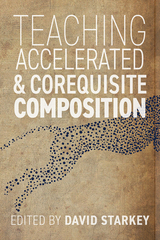
The book primarily explores accelerated composition through the lens of two-year colleges to answer a central question in the field: to what extent do educators need to alter two-year college curricular design? The contributors also delve into assessment, a crucial process for instructors and their students transitioning to accelerated learning; the key role that reading plays in the writing process; and noncognitive learning, an area of study that has been associated with accelerated learning since its inception. Together these thirteen chapters provide instructors with a strategic approach to teaching accelerated and corequisite composition.
Teaching Accelerated and Corequisite Composition points toward a new way of approaching first-year composition: a method of instruction that fosters the growth and success of writers who were once considered underprepared for college writing and are now achieving unprecedented success.
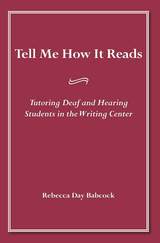
Deaf students are attending mainstream postsecondary institutions in increasing numbers, raising the stakes for the complicated and multifaceted task of tutoring deaf students at these schools. Common tutoring practices used with hearing students do not necessarily work for deaf people. Rebecca Day Babcock researched and wrote Tell Me How It Reads: Tutoring Deaf and Hearing Students in the Writing Center to supply writing instructors an effective set of methods for teaching Deaf and other students how to be better writers.
Babcock’s book is based on the resulting study of tutoring writing in the college context with both deaf and hearing students and their tutors. She describes in detail sessions between deaf students, hearing tutors, and the interpreters that help them communicate, using a variety of English or contact signing rather than ASL in the tutorials. These experiences illustrate the key differences between deaf-hearing and hearing-hearing tutorials and suggest ways to modify tutoring and tutor-training practices accordingly. Although this study describes methods for tutoring deaf students, its focus on students who learn differently can apply to teaching writing to Learning Disabled students, ESL students, and other students with different learning styles. Ultimately, the well-grounded theory analysis within Tell Me How It Reads provides a complete paradigm for tutoring in all writing centers.
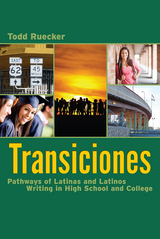
Transiciones is a thorough ethnography of seven Latino students in transition between high school and community college or university. Data gathered over two years of interviews with the students, their high school English teachers, and their writing teachers and administrators at postsecondary institutions reveal a rich picture of the conflicted experience of these students as they attempted to balance the demands of schooling with a variety of personal responsibilities.
Todd Ruecker explores the disconnect between students’ writing experiences in high school and higher education and examines the integral role that writing plays in college. Considering the almost universal requirement that students take a writing class in their critical first year of college, he contends that it is essential for composition researchers and teachers to gain a fuller understanding of the role they play in supporting and hindering Latina and Latino students’ transition to college.
Arguing for situating writing programs in larger discussions of high school/college alignment, student engagement, and retention, Transiciones raises the profile of what writing programs can do while calling composition teachers, administrators, and scholars to engage in more collaboration across the institution, across institutions, and across disciplines to make the transition from high school to college writing more successful for this important group of students.
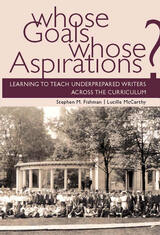
Ever since Horace Mann promoted state supported schooling in the 1850s, the aims of U.S. public education have been the subject of heated national debate. Whose Goals? Whose Aspirations? joins this debate by exploring clashing educational aims in a discipline-based university classroom and the consequences of these clashes for "underprepared" writers.
In this close-up look at a White middle-class teacher and his ethnically diverse students, Fishman and McCarthy examine not only the role of Standard English in college writing instruction but also the underlying and highly charged issues of multiculturalism, race cognizance, and social class.
READERS
Browse our collection.
PUBLISHERS
See BiblioVault's publisher services.
STUDENT SERVICES
Files for college accessibility offices.
UChicago Accessibility Resources
home | accessibility | search | about | contact us
BiblioVault ® 2001 - 2024
The University of Chicago Press









